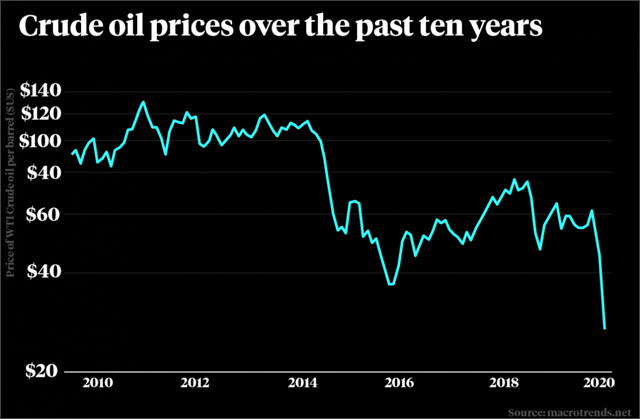“This could be coming”, energy analyst Rashid Hussain Syed had said last month
SoDATA — President Donald Trump says he will impose tariffs on crude imports if necessary to protect the U.S. oil industry, adding that Russia and OPEC are “destroying” themselves with an oil price war.
“I will do whatever I have to do” to protect the U.S. oil industry, Trump said.
Russia and Saudi Arabia are among the largest exporters of oil to the United States and the oil price war and the coronavirus pandemic have sent crude prices to around $20.
U.S. shale producer Whiting Petroleum Corporation, once one of the top producers in the Bakken, said on Wednesday that it had filed for bankruptcy protection, becoming the first major victim of the price war and the coronavirus.
Trump said April 4 during a press conference that the economies of Russia and Saudi Arabia are highly dependent on oil and “it is to their advantage” to find an agreement on an oil production cut.
His comments follow reports a day earlier that a meeting of OPEC+, the oil alliance led by Saudi Arabia and Russia, to discuss cuts will not be held on April 6 amid a continued dispute between Moscow and Riyadh.
During a meeting of OPEC+ on March 6, Russia refused to agree to a Saudi proposal for deeper production cuts.
Trump, who has been seeking to broker an agreement between the two nations, said on April 2 in a tweet that Russia and Saudi Arabia had agreed to a cut of 10 million barrels of oil a day, causing the price of crude to surge as much as 30 percent. Trump was understood to be referring to cuts by the 23-member OPEC+ alliance that the two countries lead.
The president also said April 4 the low oil price environment is hurting the U.S. oil industry, which has surpassed Saudi Arabia and Russia to become the largest in the world by daily production.
Trump, who met with energy executives at the White House the day before, said the crisis is going “to hurt of a lot of [American] jobs” but that he will take action to protect it, including imposing tariffs on oil imports.
The oil price collapse has forced many U.S. drillers, including the supermajors Exxon and Chevron, to announce significant reductions in projected spending and drilling operations, as no one in the U.S. shale patch can profitably drill a new well at $20 WTI Crude.
Analyst Dr. Cyril Widdershoven says the ongoing oil market volatility, the battle between leading producers for market share, the logistical impossibility of enforcing U.S. production cuts, and the continued demand destruction caused by COVID-19 are not issues that can be solved by an OPEC meeting.
“The OPEC meeting could send oil prices crashing below $10”, says Cyril who is a long-time observer of the global energy market.
“This could be coming”, energy analyst Rashid Hussain Syed had said last month. “Bloomberg yesterday termed Canada as the first casualty of the price war. Canadian crude is selling at around $8. It went down to almost $7 a barrel.”
Islamabad-based business consultant and analyst Irshad Salim says even if the crude average doesn’t drop to $10, the average price would add breather to Pakistan’s fiscal debt management. “Savings + deferred payments (it has in place with Saudi and UAE) could generate additional cash flow to address its markup payment or else the government could pass it through to the consumers”.







